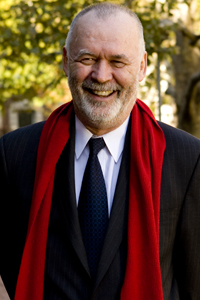 Does your undergraduate major matter when you’re applying to MBA programs? Of course it does, but maybe not in the way you might think. Traditional thinking may suggest that an undergraduate degree in economics or other business-based focus might give you an edge in admissions – as this kind of degree might better prepare students for business school – but this might not actually be the case. Continue reading
Does your undergraduate major matter when you’re applying to MBA programs? Of course it does, but maybe not in the way you might think. Traditional thinking may suggest that an undergraduate degree in economics or other business-based focus might give you an edge in admissions – as this kind of degree might better prepare students for business school – but this might not actually be the case. Continue reading
Tag Archives: Columbia Business School
Interview: Gary Biddle of Hong Kong University
Gary Biddle, dean of the Faculty of Business and Economics at Hong Kong University (HKU), discusses his school’s MBA and EMBA partnerships with London Business School and Columbia Business School, and the enduring importance of “Ny-Lon Kong.”
Is Hong Kong still a good gateway into Asia for executives?
Hong Kong has long been a bridge between East and West. Hong Kong knows the West, and it knows the East. For people coming out of China into the world or going into China from the rest of the world…when these people cross, sparks fly, because in our classes, people say, “let me tell you how things are done in Shanghai,” and another might chime in “let me tell you how things are done in Berlin or London or New York or New Delhi.” The instructors understand both, and we facilitate this exchange of insights.
Is fluency in Chinese essential for executives in Hong Kong and China? Are they coming to your program with these skills?
There’s no question that if one wants to pursue a career connected to China, you’d want to know the local language there. This is true in Germany and everywhere.
In our regular MBA program, we have a “China Track” designed specifically for people from outside of China to launch their careers in China. If they don’t know Mandarin, there’s an option that takes them to Beijing for an intensive language immursion experience. This is for someone from Europe, South Asia, or the Americas who doesn’t know Mandarin, but knows China is a big thing, and wants to have some conversational fluency in Mandarin. And then they continue during their MBA studies. There’s of course a natural limit to how much you can learn in a year and a half, but still, with this kind of structure, you can learn quite a bit.
Interview: Raymond Horton of Columbia Business School
His students may not be anything like Gordon Gekko, the ruthless antagonist of the film Wall Street. But Raymond Horton, the director of the Social Enterprise Program at Columbia Business School, says CSR- and sustainability-focused MBA grads will still be in demand in a tough economy.
How will the current financial turmoil affect the corporate social responsibility branch? I imagine that companies that have to make job cuts might look here first.
To the extent that CSR units are located in the public relations parts of businesses, you might be right. But I think there has been a sea change here. Most people from Columbia Business School who want to be social enterprisers and practice corporate social responsibility are going into operating divisions, and incorporating CSR into the basic routines and policies of the organizations. So they’re not going to get displaced. It’s just another way of saying that CSR has become a profit center in a lot of businesses.
Is now the the right time to get an MBA in this branch?
I don’t know what the experience is at other schools, but I know our applications are up over 25 percent this year. I think a lot of people figure this is a good time to get an MBA. For somebody who came out of college and went to work on Wall Street or management consulting for four or five years, if they figure they are going to get an advanced degree at some point – and maybe they’ve just gotten laid off, or they think they’re going to get laid off or not going to get a salary increase – it becomes a good time to go to school.

